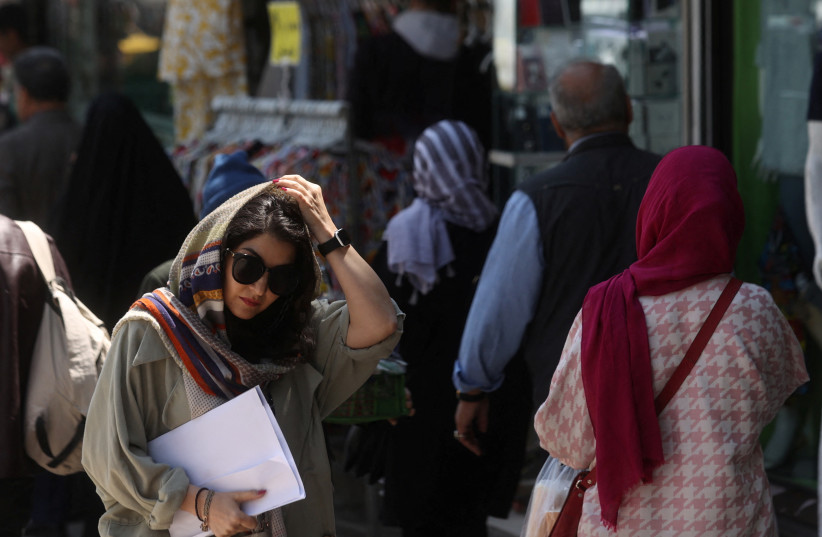World Hijab Day, an annual day to encourage women to wear the traditional Muslim head covering and to educate others on why it is worn, is being marked around the globe today, February 1.
For more stories from The Media Line go to themedialine.org
The day was established in 2013 by Bangladesh-born New York resident Nazma Khan, who told a TEDx talk that she had endured discrimination for wearing the hijab and had been referred to derogatorily as "ninja" or "Batman." Khan designated the day to inspire women around the world to embrace a life of modesty and exercise their freedom of religious expression.
However, in some countries, the wearing of a hijab has little to do with choice. In Iran and Afghanistan, women are required to wear hijabs in accordance with Islamic law.
In May 2022, the Taliban in Afghanistan issued a decree mandating that all women wear burqas, traditional Islamic garments that cover the entire body from head to toe, leaving only the eyes exposed.

In Iran, women who defy the regulations face imprisonment. The case of Mahsa Amini, a 22-year-old Iranian woman who in 2022 was sentenced to prison for not wearing a hijab and subsequently died in custody, sparked protests around the country.
A year after Amini’s death, Afsaneh Bayegan, a 61-year-old Iranian actress, received a two-year prison sentence for wearing a hat instead of a hijab.
Amini's and Bayegan's stories are just two of many incidents in Iran that have triggered protests over Islamic headwear.
Prohibiting the hijab
The situation differs significantly in Europe, with some countries deeming it necessary to prohibit the wearing of the hijab in certain public spaces. The European Union Court of Justice has declared that EU member states have the authority to prohibit the wearing of the hijab in workplaces and public schools.
In 2022, the court granted employers permission to prohibit the wearing of the hijab in workplaces, citing the goal of maintaining a neutral environment.
In Belgium, regulations prohibit women from wearing headscarves or any religious symbols in the workplace. A woman working in the municipality of Ans in Belgium who had been told by her employer that she was not allowed to wear a headscarf to observe neutrality in the workspace claimed that her employer was violating her religious freedom.
In 2004, France implemented a ban on the wearing of religious symbols and headscarves in public schools.
French Education Minister Gabriel Attal has implemented a ban on young women wearing abayas, long, loose robes, at schools.
“You enter a classroom, and you must not be able to identify the religious identity of students just by looking at them,” Attal said during an interview with a French television network.
The hijab remains a contentious issue in France, as seen in recent discussions over prohibiting its use during this year's upcoming Olympic Games in Paris. Predictably, such endeavors have sparked an international backlash, notably from the Islamic Solidarity Sports Federation.
In Saudi Arabia, female bloggers are utilizing the internet to challenge stereotypes and counter misogynistic statements surrounding the hijab and have adopted modern approaches to styling the hijab that aim to empower their Muslim female audiences.
One Saudi Arabian blogger, Amy Roko, has defied conventional expectations for covered women in Saudi Arabia with her bold comedic style and advocacy for women's rights, garnering her a following of over a million supporters.
Mira, a 19-year-old Arab Palestinian living in East Jerusalem, told The Media Line that she does not perceive wearing the hijab to be oppressive or obligatory. Instead, she said that wearing the hijab provides her with a profound sense of freedom and empowerment as a woman.
“I felt so much better after wearing the hijab," she said. "I walk in the street, and I just feel more comfortable because I know that I am wearing modest clothing, and with time it just becomes a part of you.”
Elhan Nahhas-Dahoud, a lawyer and legal advocate for the Kayan Feminist Organization in Haifa, told The Media Line that women have the right to express themselves and be represented, irrespective of their attire, background, or ethnicity.
“Women have the right to voice their opinions on various matters, including issues concerning minority groups or groups focused on women. They represent themselves not only as women but as people,” Nahhas-Dahoud said.
Lana Ikelan is a recent graduate of the Hebrew University of Jerusalem and an intern in The Media Line’s Press and Policy Student Program.
